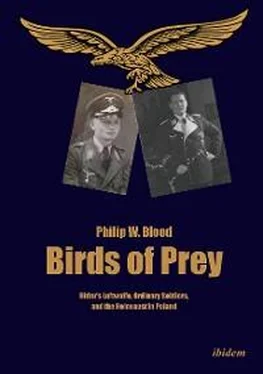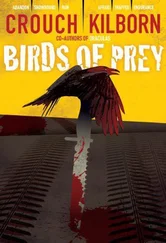Röhrig’s ideological resentment was vented against the Communists with the accusation that they had machine-gunned game as symbols of capitalism. He attacked the societal craze for money where profiteering proliferated and endangered the lives of foresters with a sharp increase in murders. There had been an increase in poaching, and he blamed the complicity of ‘unsavoury characters’ like the Salonjäger (saloon hunters), Schiesser (shooters) or Fleischmacher (meat-makers). Röhrig criticised the ‘red’ press, satirical newspapers and Artfremde (aliens) for lampooning the hunt with cheap and vile satire. He generalised that all postwar periods, throughout history, were disastrous for hunting because unemployed former soldiers turned to poaching and banditry. Poachers had never been tolerated by the hunt. If arrested, the punishments were severe with the loss of an eye or hand, or public execution. His chapters took a racial dimension when he described how Hessen had regulated against Jewish traders by making them swear an oath to report any illegal trade in furs. In Prussia, Jewish traders were forced to purchase certificates to trade furs. 12Röhrig accused Weimar politicians of hypocrisy, patronising the hunt’s feudalism and participating in private hunts, but ridiculing the hunt in parliament. The rising values of wood, forced Weimar governments to improve the lot of state foresters. This brought about improved training and schooling, but the social emphasis had shifted away from the hunt. The decline in the domestic game forced hunters to seek alternatives overseas, in safaris and hunting dangerous game in primaeval habitats. 13Writing after the Nazis were in power, Röhrig congratulated Hitler. He was grateful for the eradication of the “red” menace. The Nazis were the saviours of Germany and Göring had protected both the forest and game. Röhrig called Göring’s 1935 hunting law a “monument in his own lifetime” widening the national and classless appeal of the hunt and realising the goal of harmony with the Volksgemeinschaft. 14
Göring as chief of forestry and master of the hunt was responsible for an institution of diverse talents. The first Generalforstmeister of the Reichsforstamt (RFA) was Dr. Walter von Keudell (1884–1973), a long serving Prussian civil servant. He was removed from office in 1937 because he refused to implement Göring’s policy for cutting quotas. He was replaced by Friedrich Alpers (1901–1944), who had studied law at Heidelberg University and became a committed Nazi in 1929. Alpers took an honorary SS officer rank and in 1941 worked on the infamous hunger plan that led to the starvation of millions of people in the east. The Jagdamt (the hunt bureau) was organised as a department within the RFA. The chief of the Jagdamt was Oberjägermeister Ulrich Scherping (1889–1958) who was accountable to Keudell and later Alpers, but in practice reported directly to Göring. Scherping was the architect behind the hunting law and was deeply committed to the process of Nazification. He was born in Pomerania and began a career in the army as a cavalry officer, and like Göring was an early devotee of hunting. During the Great War, his bravery was rewarded and was promoted to the general staff of an infantry division. In August 1915, Scherping arrived in Białowieźa and was left awestruck at the magnitude of the forest. After the war, he joined Freikorps Rossbach at the same time as Rudolf Hess, Hitler’s first deputy. 15Scherping took up a career as a professional hunter and a staff writer for Der Heger (a hunt journal). In 1927, he became general manager of the Deutsche Jagdkammer (German Chamber of Hunting) an organization founded in 1920 and a year later the Reichsjagdbund (National Hunting Union). He gained a reputation as the hunt’s leading political activist and the exponent of right-wing dogma. In 1934 he acquired the title Oberstjägermeister (Colonel of the Hunt) and became Ministerial director of the Jagdamt. The adoption of Oberstjägermeister with its royalist resonance, a rank placed seventh in importance among the two thousand positions in the Kaiser’s royal household, made him a target for lampooning from Nazi rivals of which there were many. 16Scherping clung to Göring in all matters of policy, politics and rivalries, but was astute enough to cosy up to Himmler and serve on his SS personal staff. 17
Aldo Leopold, the American naturalist, visited Germany in 1935. He made observations of Göring’s reforms at work and visited Silesia to meet Günther-Hubertus Freiherr von Reibnitz, the Gaujägermeister or Regional Director, with his assistants the Kreisjägermeisters. The meeting was held in a local police station where Reibnitz’s offices were located, which reflected the future of German forestry and the Nazi police state, but Leopold did not report on anti-Semitism. 18Scherping was responsible for the Aryanisation of the hunt. In 1935 the hunt acquired self-policing powers that allowed the implementation of an Aryanised membership base. In 1937 he announced, ‘the hunt had become a closed shop to outsiders and had restored its noble reputation’, and then added that ‘the law had removed anti-social elements that gave hunters a bad name’—he meant the Jews. 19Rules were drafted to define those persons excluded from the hunt as ‘foreigners without German nationality’, which also meant Jews. 20In The Nazi Seizure of Power, Allen discovered that all the local shooting associations were quick to discriminate against Jews, cancelling their memberships once the Nazis came to power. 21Then Nazi hatred for the Jews exploded into violence on 9–10 November 1938, during Reichskristallnacht (Night of Broken Glass), which led to the arrest of more than 30,000 Jews and more than ninety killed. A few days after the violence subsided Göring hosted a conference of state officials at the Reich Air Ministry. He joked the ‘Jews could be restricted to forest areas inhabited by elk, which, like Jews, were marked by their large, crooked noses.’ 22The tragic culmination of Nazi race policies was the assistance given by the RFA in East Prussia to supply timber for the construction of the Stutthof concentration camp in 1941. 23
Long before the Nazis came to power, the hunt had departed from the natural science classifications of the renaissance to the rigid social Darwinism of the Nineteenth Century. 24In post-colonial Weimar Germany, the hunt spun fantastical and exotic accounts of the ancient and extinct game. Under the Nazis, the recreation of the Germanic game became part of a racialised zoology, game and habitat research. The science of hunting began to follow many research trajectories. In 1936 Göring founded an institute of hunting science in Hannover, which later transferred to the University of Göttingen. The Heck brothers, Lutz (1892–1983), and Heinz (1894–1982) had also been experimenting with their breeding back programme to restore the long-extinct Aurochs. Their work involved the mass observation of European cattle breeds to isolate what they believed was the special characteristics of the Aurochs. The first breeding experiments led to a breakthrough in 1934 when they sired a bull later called ‘Heck cattle’. Lutz declared the research funded by Göring was the greatest value to science and a ‘the symbol of German power and courage.’ From 1938 Rominten’s game population was re-engineered. Wild boar and five Heck Cattle were released under Göring’s orders. Eventually, five lynxes were released, the precise number recommended for game management purposes. 25Leopold described the prevailing conditions of the hunt in Germany, ‘Every acre of forestland in Germany, whether state or privately owned, is cropped for game.’ 26He blamed this on the German obsession for hunting deer, which outweighed the damage herds caused the habitat. He believed there would be long-term consequences, especially among game birds. He was deeply critical of foresters who ‘sprinkled’ hardwood trees among pine forests to achieve mixed forests but were unable to create a balance in-game management. 27Leopold and other foreign either overlooked or ignored the prevailing Nazi racialism—both the game stock and the people were being Aryanised.
Читать дальше












